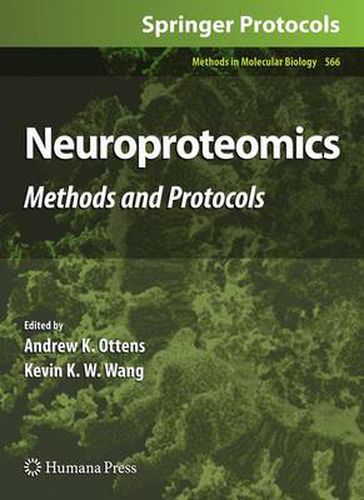Readings Newsletter
Become a Readings Member to make your shopping experience even easier.
Sign in or sign up for free!
You’re not far away from qualifying for FREE standard shipping within Australia
You’ve qualified for FREE standard shipping within Australia
The cart is loading…






Neuroproteomics: Methods and Protocols presents experimental details for applying proteomics to the study of the central nervous system (CNS) and its dysfunction through trauma and disease. The target audience includes clinical or basic scientists who look to apply proteomics to the neurosciences. Often researchers hear of proteomics without an adequate explanation of the methodology and inherent limitations. This volume conveys where proteomic methodology is in its application to CNS research and what results can be expected. We also address clinical translation of neuroproteomics, specifically in the area of biomarker research. The inception of neuroproteomics capitalized on rapid progress in large-molecule mass spectrometry over the last decade. Two seminal advances have spurred research - development of reliable polypeptide ionization processes and bioinformatics to rapidly process tandem mass spectra for peptide identification and quantification. What has followed is the exponential application of mass spectrometry to proteome characteri- tion across biological and biomedical disciplines. Arguably, the most elaborate proteomic implementation is in studying the CNS, the most enigmatic and complex animal system. Neuroscience is characterized by grandiose questions - what is consciousness, how does thought or memory work. Neuroproteomics researchers, however, have pri- rily involved themselves dysfunction, based on a pressing need (and invariably funding), in answering questions on CNS dysfunction, based on a pressing need (and invariably funding), and because such questions hold more accessible answers. Dysfunction is readily contrasted against normal function and presumably produces a lasting differential protein signature.
$9.00 standard shipping within Australia
FREE standard shipping within Australia for orders over $100.00
Express & International shipping calculated at checkout
Neuroproteomics: Methods and Protocols presents experimental details for applying proteomics to the study of the central nervous system (CNS) and its dysfunction through trauma and disease. The target audience includes clinical or basic scientists who look to apply proteomics to the neurosciences. Often researchers hear of proteomics without an adequate explanation of the methodology and inherent limitations. This volume conveys where proteomic methodology is in its application to CNS research and what results can be expected. We also address clinical translation of neuroproteomics, specifically in the area of biomarker research. The inception of neuroproteomics capitalized on rapid progress in large-molecule mass spectrometry over the last decade. Two seminal advances have spurred research - development of reliable polypeptide ionization processes and bioinformatics to rapidly process tandem mass spectra for peptide identification and quantification. What has followed is the exponential application of mass spectrometry to proteome characteri- tion across biological and biomedical disciplines. Arguably, the most elaborate proteomic implementation is in studying the CNS, the most enigmatic and complex animal system. Neuroscience is characterized by grandiose questions - what is consciousness, how does thought or memory work. Neuroproteomics researchers, however, have pri- rily involved themselves dysfunction, based on a pressing need (and invariably funding), in answering questions on CNS dysfunction, based on a pressing need (and invariably funding), and because such questions hold more accessible answers. Dysfunction is readily contrasted against normal function and presumably produces a lasting differential protein signature.